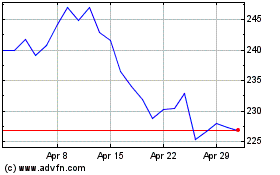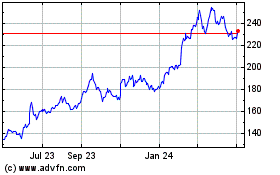Auto Sales Stood Firm Last Year -- WSJ
January 04 2019 - 3:02AM
Dow Jones News
The sales for last year hit about 17.3 million vehicles, up less
than 1% from a year earlier.
By Adrienne Roberts
This article is being republished as part of our daily
reproduction of WSJ.com articles that also appeared in the U.S.
print edition of The Wall Street Journal (January 4, 2019).
U.S. auto sales held steady last year despite predictions the
market would cool, capping the best four-year period ever for the
industry.
The industry sold about 17.3 million vehicles in 2018, up less
than 1% from a year earlier. That marked a record fourth straight
year surpassing the 17 million level, a resilient showing for an
industry prone to boom-and-bust cycles.
Still, auto executives remain wary of a market slowdown in the
U.S., as rising interest rates on car loans and lofty new-vehicle
prices make it more difficult for American buyers to afford new
wheels.
General Motors Co., the largest U.S. auto maker by sales, on
Thursday said its fourth-quarter sales totaled 785,229 vehicles,
down 2.7%. GM last year moved to quarterly sales reporting from
monthly.
Ford Motor Co. on Thursday said it would follow GM by switching
to quarterly sales reports. Ford said sales dropped 8.8% to 219,632
vehicles in December, and Toyota Motor Corp. posted flat sales,
with 220,910 vehicles.
Fiat Chrysler Automobiles NV and Nissan Motor Co. both had
strong months, with Fiat Chrysler selling 196,520 vehicles, a 14%
increase, and Nissan posting a 7.6% increase to 148,720 units for
the month.
For the year, the auto makers reported mostly flat sales, with
the exception of Fiat Chrysler's 9% sales gain and Nissan's 6%
decline.
Analysts again see a decline in U.S. sales this year. The dealer
association predicts 16.8 million vehicle sales for 2019.
Rates on new-car loans are expected to continue creeping higher,
while auto makers are offering fewer cut-rate lease deals, making
it tougher for consumers to work out affordable monthly payments,
analysts and dealers say.
More-appealing options on the used-car lot also have begun to
pressure new-vehicle sales.
Some auto executives have said they are planning for a market
contraction because of the cyclical nature of the auto industry,
even though the economy remains strong.
GM said last month that it will close several North American
factories and lay off as many as 14,000 workers. The restructuring
is aimed at eliminating several weak-selling car lines and cutting
costs to sustain profits even if sales were to test the lows of a
decade ago, though the company has said it sees no imminent red
flags for the U.S. market.
In a statement, Kurt McNeil, GM's U.S. vice president of sales
operations, said GM is confident in the outlook for 2019 because of
the strong economy and the pending rollout of several redesigned
pickup trucks and large sport-utility vehicles, which are GM's
biggest moneymakers.
For now, the economic backdrop for continued robust vehicle
sales remains intact, with low unemployment and strong consumer
confidence, analysts say.
Gasoline prices remain low, which should continue to stoke
demand for the larger SUVs and pickup trucks.
Gordie Stewart, a Toyota dealer near Birmingham, Ala., said his
sales in 2018 matched the previous year, though it has gotten more
difficult to qualify some buyers for car loans. He expects things
to get tougher this year.
"We've been at this level for a long time, but these things
can't last forever," he said. "I would sign on the dotted line
right now for flat sales this year."
Write to Adrienne Roberts at Adrienne.Roberts@wsj.com
(END) Dow Jones Newswires
January 04, 2019 02:47 ET (07:47 GMT)
Copyright (c) 2019 Dow Jones & Company, Inc.
Toyota Motor (NYSE:TM)
Historical Stock Chart
From Jun 2024 to Jul 2024

Toyota Motor (NYSE:TM)
Historical Stock Chart
From Jul 2023 to Jul 2024
